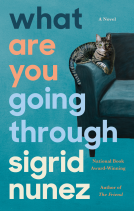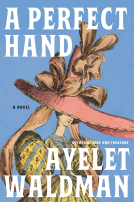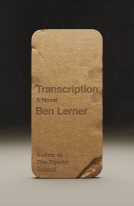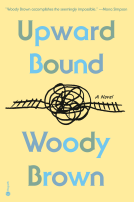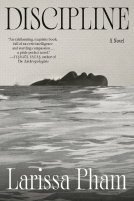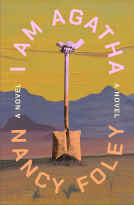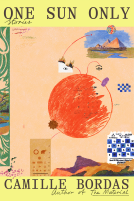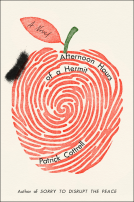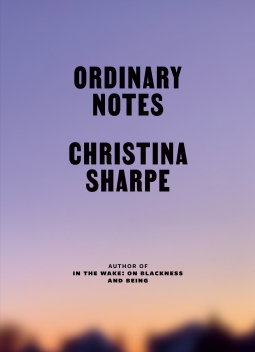
Ordinary Notes
by Christina Sharpe
This title was previously available on NetGalley and is now archived.
Send NetGalley books directly to your Kindle or Kindle app
1
To read on a Kindle or Kindle app, please add kindle@netgalley.com as an approved email address to receive files in your Amazon account. Click here for step-by-step instructions.
2
Also find your Kindle email address within your Amazon account, and enter it here.
Pub Date Apr 25 2023 | Archive Date May 31 2023
Talking about this book? Use #OrdinaryNotes #NetGalley. More hashtag tips!
Description
A finalist for the National Book Award in Nonfiction
A finalist for the National Book Critics Circle Award in Nonfiction
Named a Best Book of 2023 by The New York Times, NPR, New York magazine, Kirkus, and Barnes and Noble
The critically acclaimed author of In the Wake, “Christina Sharpe is a brilliant thinker who attends unflinchingly to the brutality of our current arrangements . . . and yet always finds a way to beauty and possibility” (Saidiya Hartman).
A singular achievement, Ordinary Notes explores profound questions about loss and the shapes of Black life that emerge in the wake. In a series of 248 notes that gather meaning as we read them, Christina Sharpe skillfully weaves artifacts from the past—public ones alongside others that are poignantly personal—together with present realities and possible futures, intricately constructing an immersive portrait of everyday Black existence. The themes and tones that echo through these pages, sometimes about language, beauty, and memory, sometimes about history, art, photography, and literature, always attend, with exquisite care, to the ordinary-extraordinary dimensions of Black life.
At the heart of Ordinary Notes is the indelible presence of the author’s mother, Ida Wright Sharpe. “I learned to see in my mother’s house,” writes Sharpe. “I learned how not to see in my mother’s house . . . My mother gifted me a love of beauty, a love of words.” Using these gifts and other ways of seeing, Sharpe steadily summons a chorus of voices and experiences to the page. She practices an aesthetic of “beauty as a method,” collects entries from a community of thinkers toward a “Dictionary of Untranslatable Blackness,” and rigorously examines sites of memory and memorial. And in the process, she forges a brilliant new literary form, as multivalent as the ways of Black being it traces.
Color art throughout
Advance Praise
“Christina Sharpe’s Ordinary Notes is an extraordinary gift to readers, gathering between its covers all manner of reading, as it explores, with formal daring and analytical aplomb, history, society, politics, and culture, particularly where and when they intersect with Black lives, including the writer’s own. Among the many achievements here, these exemplary notes—which include a stirring recounting of the author’s intellectual and aesthetic formation, and a tribute to motherly and familial love in the face of this country’s and world’s relentless brutalities—show how one might combine memoir, memorial, literary criticism, political and cultural critique, and theoretical accounting in order to imagine a new model, suffused with grace, subtlety, rigor, and care, for how to read and think with and against, which is to say, to produce true and lasting knowledge.”
—John Keene, author of Counternarratives
“Ordinary Notes is like an intellectual ice climb—you move along a careful series of handholds to cross a terrain that might otherwise seem impassable, and afterward, you are amazed at the passage. At once an act of careful attention and a juxtaposition of observations and questions, the result is a powerful vision of American life, drawn from the Black intellectual history and aesthetics that Sharpe has cultivated as the means to her own liberation, so that she might offer it to others.”
—Alexander Chee, author of How to Write An Autobiographical Novel
“Christina Sharpe is a brilliant thinker who attends unflinchingly to the brutality of our current arrangements and the violence of antiblackness and yet always finds a way to beauty and possibility. With exacting detail, she conveys the heartbreak of the imposed order and the openings that reside in the ordinary and offers a method, a poetics for refusing and exceeding the given, for sustaining life, for breaking the colonial frame, and imagining what might emerge at the end of the known world. Ordinary Notes is an exquisite text. It demands everything of the reader and, in turn, offers us a vocabulary for living.”
—Saidiya Hartman, author of Wayward Lives, Beautiful Experiments
“Ordinary Notes is a long regard, a movement along the possibilities, and the stillness, at the heart of thinking. In these pages, we experience continuities but not endings, and every person is asked to face their present and to see and feel and think without innocence. Ordinary Notes will forever alter each reader who grapples with its disquiet and its beauty.”
—Madeleine Thien, author of Do Not Say We Have Nothing
Available Editions
| EDITION | Other Format |
| ISBN | 9780374604486 |
| PRICE | $35.00 (USD) |
| PAGES | 392 |
Available on NetGalley
Average rating from 8 members
Featured Reviews
Christina Sharpe's careful and incisive attention to the commonplace, everyday racial tones of American culture are what make her "Ordinary Notes" extraordinary. The title informs the shape of the book, as it is a collection of over 200 notes that are riffs on central themes, rooted in eight thematic sections and that expand broadly and wisely. Many notes are punctuated by photos, which helps group and distinguish certain clusters of notes, as well as present a welcome multi-media approach to what is otherwise an academic text.
Why "notes," specifically? Everyone takes notes of some kind; everyone makes lists, or jots down thoughts that are important or worth fleshing out later. Everyone has written or received brief sentences of love, encouragement, congratulations, gratitude, or otherwise in cards and books, on napkins and scratch pieces of paper. It is a simple and clever way to approach the subject and history of race and racism. But the notes also help collect and categorize the aspects of this text that can be considered memoir or (auto)biographical writing; the notes allow the text to take many shapes.
Many of the notes are one or two sentences, and if I had to choose a failing or missed opportunity of the book, it would be these enigmatic notes that occur throughout. They can often be connected to the notes that surround them, but I tried to treat each note as a separate thought and give it attention in its own right. If anything, having short, single notes scattered throughout gave me room to breathe and collect my own thoughts about what I had read up until that point.
Sharpe's signature brilliance is on full display here, and I really appreciated meditating on these notes, marking several dozen to revisit and think about in greater detail. Similar to how "In the Wake" begins with Sharpe's family history, "Ordinary Notes" continues this tradition, and it's rare for an author to maintain such a tasteful balance between revealing themselves and their personal lives, while also framing their anecdotes within an academic framework.
Readers might not click with each of the 200+ notes, but there will certainly be many that any reader can connect with and whose critical reflexes will be engaged and provoked. I'm excited for others to read and discuss this book once it comes out in April.
 Reviewer 1024490
Reviewer 1024490
Christina Sharpe’s In the Wake: On Blackness and Being (2016) is one of my favorite academic books, not only for its contributions to Black studies but also for the ways Sharpe expands academic form. She is a poetic theorist, constantly insisting on personal experience not only as evidence, but as theory itself. Ordinary Notes pushes Sharpe’s methods even further, exploding genre. It is a series of 248 “notes,” none more than five pages in length. The notes are personal and familial anecdotes; pieces of history; analyses of artworks and museum exhibitions; commonplace collections of others’ words; questions and suppositions.
What is this book about? What isn’t this book about? Sharpe continues to organize her work around questions about Blackness, but there are no limits to what this encompasses, the range of philosophical questions and affective universes she covers. In Ordinary Notes, the punishing ordinariness of anti-Blackness sits alongside the imaginative pluripotency of Blackness, Black aliveness.
Sharpe unsettles master narratives of race and genre, utilizing aspects of memoir while refusing to become an instructive “race memoir.” The work echoes Citizen in places with short memories of anti-Black encounters, but exceeds it intellectually (and includes explicit critique of Claudia Rankine, among other thinkers).
The book is deeply intertextual, considering many other Black scholars and thinkers (and including some of their definitions “toward a dictionary of untranslatable blackness”) as well as structures of whiteness. An incisive series probes the National Memorial for Peace and Justice and how it might reify whiteness.
Sharpe’s mother, Ida Wright Sharpe, is at the center of this book—grief over her passing (twenty-five years ago—grief never ends), the questions and ideas raised by her brilliant life.
This is the kind of book I dream of writing, so much broader and deeper than one in traditional long chapters. I also want to get a hard copy because some of the images didn’t render well in ebook form. Read Christina Sharpe. Read this book.
Readers who liked this book also liked:
We Are Bookish
Multicultural Interest, OwnVoices, Teens & YA
Patrick Cottrell
General Fiction (Adult), LGBTQIAP+, Multicultural Interest

